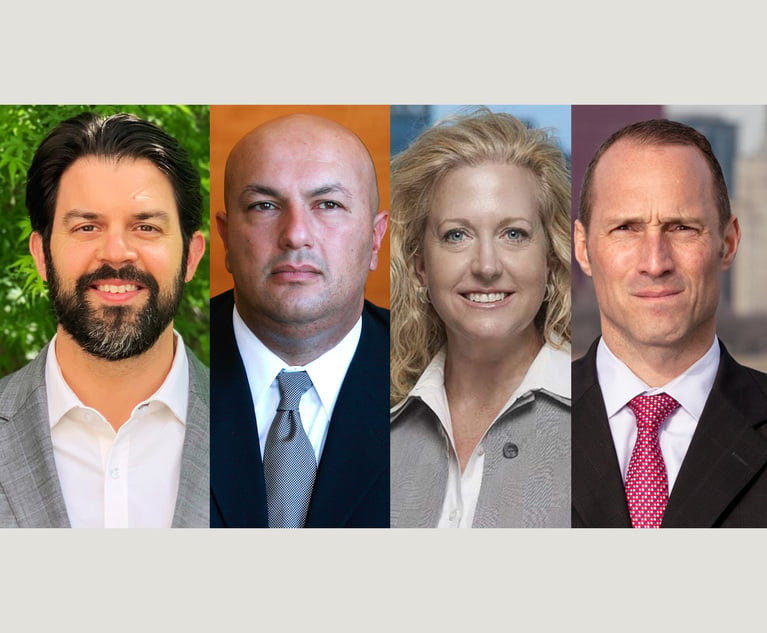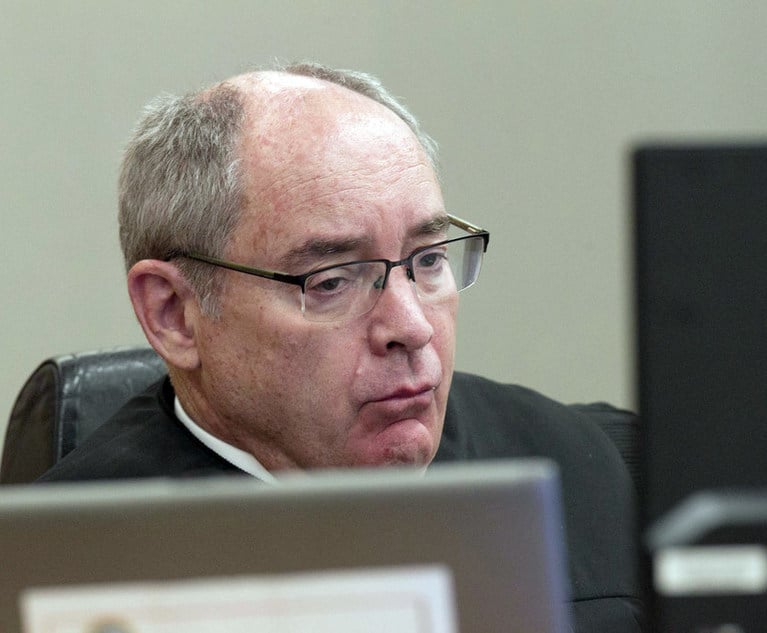Hemp Businesses in NJ Poised to Grow Tall and Strong
A primer on New Jersey's new Hemp Program, through which hemp growers, producers and retailers alike may capitalize on new hemp-based business opportunities in the Garden State.
July 10, 2020 at 01:00 PM
6 minute read
 Ryland zweifel / Shutterstock.com
Ryland zweifel / Shutterstock.com
Many New Jerseyans may have found themselves lost in the weeds these past few months as our world adjusted to life during a pandemic like no other before it. As our "new normal" emerges, businesses in New Jersey and elsewhere seek new opportunities. In this month's edition, we present a primer to explain New Jersey's new Hemp Program. Through it, hemp growers, producers and retailers alike may capitalize on new hemp-based business opportunities in New Jersey. With annual revenues expected to exceed $11 billion by 2024, the hemp market looks ripe for commercialization in New Jersey, thanks to the "Farm Bill" act of 2018.
In 2018, the federal government passed the Agriculture Improvement Act of 2018, better known as the "Farm Bill." This Act legalized hemp by removing it, and its derivatives (CBD), from the legal definition of "marijuana" under the Controlled Substances Act. It further provided a framework for the cultivation of hemp in the United States. Although the United States Department of Agriculture (USDA) is the regulatory authority at the federal level, states are given the option to regulate within their borders by submitting a plan for approval to the USDA.
The New Jersey Department of Agriculture (NJDA) enacted its Hemp Farming Act in August of 2019 in compliance with the Farm Bill. By Dec. 27, 2019, New Jersey became one of the first states to receive the green light from the USDA to move forward with its hemp program. The goal of the program, codified at N.J.A.C. 2:25-1.1 et al, is to provide licenses for growing, processing, and handling hemp legally within New Jersey. Unlike the Request for Applications process in New Jersey, where applicants may apply to obtain a license to operate an alternative treatment center ("RFA Process"), the process to obtain a license under the hemp program is structured and easy to follow. However, in both processes, each applicant is required to undergo a background check, secure site control, and demonstrate prior history or experience in hemp cultivation.
Hemp Grower and Processor/Handler Licenses
The program consists primarily of two types of applications: (1) a "Hemp Grower License" and (2) a "Hemp Processor/Handler License." The program defines a "grower" as any person who cultivates hemp. A "hemp processor" is defined to include, but is not limited to, entities acquiring raw hemp materials and processing them into products. A "handler" is defined as any person who possesses or stores a hemp plant on premises owned, operated, or controlled by a hemp producer for any period of time or in a vehicle for any period of time other than during the actual transport. Some examples of handlers include seed cleaners, harvesting entities, analytical labs, brokers, and other service providers.
The applications may be submitted to the NJDA on a rolling basis by both individuals and entities and must include the associated application fee, which varies depending on the type of license. The NJDA recommends applicants to apply at least 30 days prior to the anticipated date of planting seeds, handling, or processing hemp, whichever is applicable. If awarded an application, license holders are also required to pay annual fees which vary based on the type of license. To date, the NJDA has listed eight entities that received hemp processing licenses on its website. It is not clear how many applications have been received by the NJDA, nor do we know if a cap on the number of available licenses will be implemented in the near future. As opportunities in the hemp industry become more apparent to New Jerseyans, hemp stakeholders should keep in mind that oversubscription may lead to limits on the number of licenses and the imposition of other restrictions and limitations similar to those intrinsic to the competitive RFA Process for obtaining a license to operate an alternative treatment center in New Jersey (e.g., such as limiting the number of licenses available and/or the types of licenses available in each region of New Jersey).
Owners of farmland and greenhouse growers may now add hemp as another crop as long as the seeds work for the New Jersey climate and are compliant under the hemp program. The NJDA has a list of approved hemp seed providers, and any strain outside of the list requires written approval from the NJDA. What is tricky about hemp is cultivating hemp that meets the current legal limits of containing no more than 0.3 % THC. Though the rules under the New Jersey Hemp Program have stated that producers would not be prosecuted under federal law if their hemp is tested within the range of 0.3%-0.5% THC, the crop would still have to be destroyed and cannot be used in any way. The NJDA conducts annual site inspections, practices unannounced visits and requires lab testing of hemp samples to ensure compliance before cultivation and throughout the harvest.
Beyond medicinal benefits, hemp is known to have over 25,000 uses, from use as rope, paper, fiber in fabrics, foods, cosmetics, oil, paint, and many other consumer products. It has been around for thousands of years with documented agricultural usages dating back to 10,000 BC when hemp was revealed by a Taiwanese artifact and, throughout time, hemp and its applications have become ubiquitous, incorporated into literally thousands of products, from health foods to skin care products.
Regarding the commercial potential for hemp as a medicinal remedy, the 2019 Hemp Business Fact Book predicts U.S. hemp-derived CBD retail sales will exceed $11 billion by 2024. The competition in New Jersey for hemp has not yet heated up as it has in other parts of the nation. The leaders in New Jersey's burgeoning hemp market have not yet established themselves, but these next few years will set the foundation for those who aspire to distinguish themselves as leaders in the New Jersey market. Hemp producers and retailers have opportunities in the agricultural sector, and many other commercial entities may use hemp in applications beyond agricultural production, including, but not limited to, the development of consumer and industrial textiles (such as twine, rope, canvas, tarps, diapers, denim, shoes and fabrics), the creation of building materials (such as fiberboard, insulation, cement, stucco and mortar), and even the production of personal hygiene products (such as soap, shampoo, bath gels, cosmetics and lotions).
Get ready. New Jersey is, after all, called the "Garden State" of the nation for a reason.
Lisa Gora is an attorney at Wilentz, Goldman & Spitzer, in Woodbridge, who practices on the Health Law and Corporate teams. Chirali Patel is an attorney at Carella, Byrne, Cecchi, Olstein, Brody & Agnello, in Roseland, who practices Class Action litigation and Cannabis Law.
This content has been archived. It is available through our partners, LexisNexis® and Bloomberg Law.
To view this content, please continue to their sites.
Not a Lexis Subscriber?
Subscribe Now
Not a Bloomberg Law Subscriber?
Subscribe Now
NOT FOR REPRINT
© 2025 ALM Global, LLC, All Rights Reserved. Request academic re-use from www.copyright.com. All other uses, submit a request to [email protected]. For more information visit Asset & Logo Licensing.
You Might Like
View All

MDL Judge: 'Significant Number of Plaintiffs' Can't Allege Paraquat Exposure
8 minute read
Why the Wide Range of Roundup Verdicts? It Might Depend on What Juries Hear About the EPA
8 minute read
Roundup MDL Lead Counsel Defend Fee Allocations: 'Limited Funds Available'
5 minute readLaw Firms Mentioned
Trending Stories
Who Got The Work
J. Brugh Lower of Gibbons has entered an appearance for industrial equipment supplier Devco Corporation in a pending trademark infringement lawsuit. The suit, accusing the defendant of selling knock-off Graco products, was filed Dec. 18 in New Jersey District Court by Rivkin Radler on behalf of Graco Inc. and Graco Minnesota. The case, assigned to U.S. District Judge Zahid N. Quraishi, is 3:24-cv-11294, Graco Inc. et al v. Devco Corporation.
Who Got The Work
Rebecca Maller-Stein and Kent A. Yalowitz of Arnold & Porter Kaye Scholer have entered their appearances for Hanaco Venture Capital and its executives, Lior Prosor and David Frankel, in a pending securities lawsuit. The action, filed on Dec. 24 in New York Southern District Court by Zell, Aron & Co. on behalf of Goldeneye Advisors, accuses the defendants of negligently and fraudulently managing the plaintiff's $1 million investment. The case, assigned to U.S. District Judge Vernon S. Broderick, is 1:24-cv-09918, Goldeneye Advisors, LLC v. Hanaco Venture Capital, Ltd. et al.
Who Got The Work
Attorneys from A&O Shearman has stepped in as defense counsel for Toronto-Dominion Bank and other defendants in a pending securities class action. The suit, filed Dec. 11 in New York Southern District Court by Bleichmar Fonti & Auld, accuses the defendants of concealing the bank's 'pervasive' deficiencies in regards to its compliance with the Bank Secrecy Act and the quality of its anti-money laundering controls. The case, assigned to U.S. District Judge Arun Subramanian, is 1:24-cv-09445, Gonzalez v. The Toronto-Dominion Bank et al.
Who Got The Work
Crown Castle International, a Pennsylvania company providing shared communications infrastructure, has turned to Luke D. Wolf of Gordon Rees Scully Mansukhani to fend off a pending breach-of-contract lawsuit. The court action, filed Nov. 25 in Michigan Eastern District Court by Hooper Hathaway PC on behalf of The Town Residences LLC, accuses Crown Castle of failing to transfer approximately $30,000 in utility payments from T-Mobile in breach of a roof-top lease and assignment agreement. The case, assigned to U.S. District Judge Susan K. Declercq, is 2:24-cv-13131, The Town Residences LLC v. T-Mobile US, Inc. et al.
Who Got The Work
Wilfred P. Coronato and Daniel M. Schwartz of McCarter & English have stepped in as defense counsel to Electrolux Home Products Inc. in a pending product liability lawsuit. The court action, filed Nov. 26 in New York Eastern District Court by Poulos Lopiccolo PC and Nagel Rice LLP on behalf of David Stern, alleges that the defendant's refrigerators’ drawers and shelving repeatedly break and fall apart within months after purchase. The case, assigned to U.S. District Judge Joan M. Azrack, is 2:24-cv-08204, Stern v. Electrolux Home Products, Inc.
Featured Firms
Law Offices of Gary Martin Hays & Associates, P.C.
(470) 294-1674
Law Offices of Mark E. Salomone
(857) 444-6468
Smith & Hassler
(713) 739-1250






